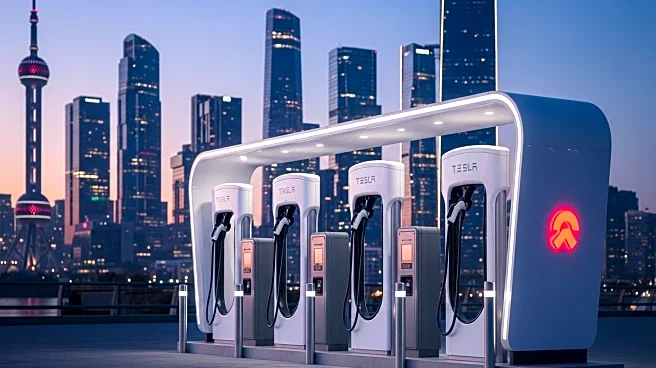What's Happening?
Nio, a Chinese electric vehicle (EV) manufacturer, has reported significant sales figures, challenging the dominance of established giants like Tesla and BYD in the EV market. In August, Nio delivered 31,305 vehicles, including 10,525 from its premium brand and 16,434 from its family-oriented ONVO brand. The company also delivered 4,346 FIREFLY vehicles, its high-end offering. Nio's cumulative deliveries reached 838,036, setting a new company record. The ONVO L90 model achieved a milestone by exceeding 10,000 units in its first full month. Nio's stock price has risen 81% since its last earnings announcement, and analysts expect a reduced loss of $0.31 per share in the upcoming earnings report.
Why It's Important?
Nio's impressive sales figures and stock performance indicate a growing challenge to Tesla and BYD's dominance in the EV market. With vehicle margins increasing to 10.2% and overall gross margin improving to 7.6% year-over-year, Nio is positioned to attract more investors and buyers. The launch of new models like the ES6, EC6, ET5, and ET5P is expected to further boost deliveries. As Nio continues to expand its product offerings and improve financial metrics, it could reshape competitive dynamics in the EV industry, potentially impacting market shares and investment strategies.
What's Next?
Nio is set to release its earnings report before the market opens, with analysts anticipating a reduced loss compared to previous quarters. The company's new fleet of vehicles is expected to drive increased deliveries later this year. Investors and industry observers will be closely watching Nio's performance and strategic moves, as they could influence future market trends and competitive strategies among major EV manufacturers.
Beyond the Headlines
Nio's success in challenging established players like Tesla and BYD highlights the evolving landscape of the EV market, where innovation and strategic expansion are key to gaining market share. The company's ability to deliver what consumers want and improve financial metrics could lead to long-term shifts in investment patterns and consumer preferences, potentially influencing the broader automotive industry.










